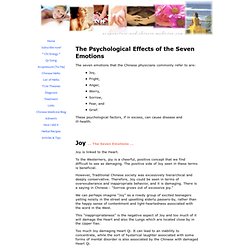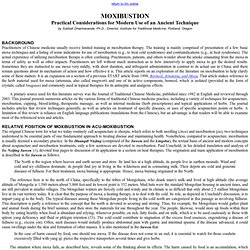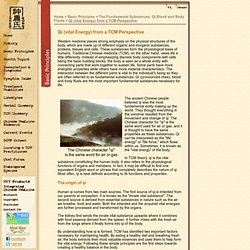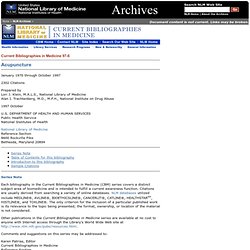

The Seven Emotions in Chinese Medicine. The Psychological Effects of the Seven Emotions The seven emotions that the Chinese physicians commonly refer to are: Joy,Fright,Anger,Worry,Sorrow,Fear, andGrief.

These psychological factors, if in excess, can cause disease and ill-health. Joy ... The Seven Emotions ... Joy is linked to the Heart. To the Westerners, joy is a cheerful, positive concept that we find difficult to see as damaging. However, Traditional Chinese society was excessively hierarchical and deeply conservative. We can perhaps imagine "Joy" as a rowdy group of excited teenagers yelling noisily in the street and upsetting elderly passers-by, rather than the happy sense of contentment and light-heartedness associated with the word in the West.
This "inappropriateness" is the negative aspect of Joy and too much of it will damage the Heart and also the Lungs which are located close by in the Upper fiao. Too much Joy damaging Heart Qi. Fright ... Worry ... Sorrow ... Sorrow is linked to the Lungs. Grief ... Fear ... Anger ... Moxibustion: Practical Considerations for Modern Use of an Ancient Technique. Return to itm online Practical Considerations for Modern Use of an Ancient Technique by Subhuti Dharmananda, Ph.D., Director, Institute for Traditional Medicine, Portland, Oregon Practitioners of Chinese medicine usually receive limited training in moxibustion therapy.

The training is mainly comprised of presentation of a few basic moxa techniques and a listing of some indications for use of moxibustion (e.g., to treat cold syndromes) and contraindications (e.g., in heat syndromes). The actual experience of utilizing moxibustion therapy is often confusing. A primary source used for this literature survey was the Journal of Traditional Chinese Medicine, published since 1982 in English and reviewed through 2003. The original Chinese term for what we today routinely call acupuncture is zhenjiu, which refers to both needling (zhen) and moxibustion (jiu), two techniques understood to be essential parts of one fundamental approach to treating disease and maintaining health.
Traditional Chinese Medicine (TCM) - Sacred Lotus Arts. Chinese Medicine Sites and Resources. Acupuncture - Balancing Your Vital Energy Flows. American Academy of Medical Acupuncture Homepage. Medicinal Herbs Guide - Natural Herbs Guide - Healing Herbs Guide. BLOOD - QI and Energy JING BLOOD BODY FLUIDS[TCM Discovery Net] TCM Glossary. Compassionate Dragon Healing - Home. Links. TCM Herbal formulas - Acupuncture & Traditional Chinese Medicine information (Vancouver, Chinese herbal medicine, tuina massage, Chinese herbs, pictures, women's health, Chinese medicine history, common disease treatment, acupuncture theory, points), webl. Your Guide to Herbal Supplements, Herbal Remedies, and Traditional Chinese Medicine.
Traditional chinese medicine information, references & applications. TCM, Traditional Chinese Medicine, Drugstore, Drug Store, TCM Pharmacy, Prescription Drugs, Medicine, Medical, Pharmaceutical and Surgical Products, Medical Products by Wyith Ltd d/b/a Traditional Chinese Medicine Basics (TCMBasics.com) - Resources, Herbs. Traditional Chinese Medicine. Qi (vital Engergy) from a TCM Perspective. Qi (vital Energy) from a TCM Perspective Western medicine places strong emphasis on the physical structures of the body, which are made up of different organic and inorganic substances, proteins, tissues and cells.

These substances form the physiological basis of humans. Traditional Chinese medicine (TCM), on the other hand, views life a little differently. Instead of emphasizing discrete body components with cells being the basic building blocks, the body is seen as a whole entity with connecting parts that work together to sustain life. Some parts have more energetic properties while others have more material characteristics. The interaction between the different parts is vital to the individual's being so they are often referred to as fundamental substances.
The ancient Chinese people believed qi was the most fundamental entity making up the world. In TCM theory, qi is the vital substance constituting the human body. Human qi comes from two main sources. Acupuncture (CBM 97-6) January 1970 through October 1997 2302 Citations Prepared by Lori J.

Klein, M.A.L.S., National Library of MedicineAlan I. Trachtenberg, M.D., M.P.H., National Institute on Drug Abuse 1997 October. Home. Valentines EDay Special Edition, Holistic Living, a place to relax, inspirational, recipes, foods, news, herbal teas. Activity, Health, Nature, Fashion, TCM course, Prevention, Treatment, Travel. Acupuncture.Com - Home of Traditional Chinese Medicine. Article Directory. Sample articles - The Journal of Chinese Medicine. Academiccatalog.pdf (application/pdf Object)